Pakistan calls for fair global reforms to tackle plastic crisis
Musadik Malik proposes new treaty measures linking responsibility to plastic consumption
August 12, 2025

- Malik highlights Global South’s low plastic use.
- Credits system proposed for recycling progress rewards.
- Plastic Fund to support affected developing nations.
ISLAMABAD: Federal Minister for Climate Change and Environmental Coordination Dr Musadik Malik has urged the world to adopt bold and equitable measures to address the mounting plastic pollution crisis, warning that developing nations should not be used as dumping grounds for waste they did not generate.
Dr Malik said wealthy nations consumed up to 20 times more plastic than poorer countries but exported their low-value, contaminated or non-recyclable waste to the Global South, often disguised as “recyclables.”
He was speaking at the Informal Ministerial Dialogue on “Investment Opportunities for a Circular Economy in the Context of the Global Plastic Treaty” during the Fifth Session of the Intergovernmental Negotiating Committee on Plastic Pollution (INC-5.2) in Geneva.
He noted that without advanced recycling infrastructure, much of this imported waste ended up in open landfills, burned in communities or polluting rivers and seas — poisoning air, soil and water, and harming public health.
Dr Malik pointed out that per capita plastic consumption in Western Europe was 150 kilograms annually, compared to just 7 kilogrammes in Pakistan, 8 in India, and 6 in Bangladesh, with similar levels in Nigeria, Ethiopia and Kenya.
Despite such low consumption, he said, these countries bore the heaviest burden of plastic waste.
“Our people, Pakistani people, are paying the price for a problem they did not create,” he said. “We cannot allow the plastic crisis to become yet another injustice for the Global South.”
The minister proposed a two-pronged approach for the Global Plastic Treaty:
Extended Consumer Responsibility (ECR) Framework — linking responsibility to consumption levels, with high-consuming nations paying into a Plastic Fund to finance recycling facilities and technology in affected developing countries.
Global Plastics Credit Market — a system modelled on carbon credits, enabling high-consuming countries to purchase credits from developing nations that make measurable progress in recycling, waste prevention and collection.
Dr Malik stressed that these initiatives would ensure environmental action delivers social and economic benefits, including integrating informal waste workers into safer, formal jobs.
“Plastic pollution is not just an environmental issue, it’s an issue of justice, fairness, and sovereignty,” he said, vowing that Pakistan would lead the push for a global system where no country is turned into a waste dumping site.
'New bloc of voiceless countries'
As per an official handout, in this debate about plastics and related treaties, developing and affected countries, especially Pakistan, are voiceless.
The tug is between Europe and plastic proficient countries, regardless of the countries that face serious and adverse effects of plastics, especially Pakistan.
"Plastic waste is produced by the packagers and consumers — nearly all of them in the western world. Producers produce the polymers from which plastic is created. Packaging is done in Europe and the western world."
It mentioned that Pakistan isn't against either of the above groups, rather, it is simply safeguarding its national safety and political interests.
"Plastic waste is either exported to countries like Pakistan, which makes them junkyards of the world, or it is dumped in the oceans from where it floats to the shores and waterbeds of the affected countries, polluting our water, fish and agriculture and human health."
Pakistan, under the leadership of the prime minister, has decided to lead the voiceless countries of the world and empower them to protect their environment and future generations on their terms.
"Pakistan is trying to create a new bloc of voiceless countries. Pakistan, on the sidelines, has called for and has gotten the following meetings in this regard, which Pakistan will lead.
"...the following meetings have taken place or are underway, organised by Pakistan’s Permanent mission led by Ambassador Bilal Ahmad, who is showing high leadership."
Meanwhile, Dr Malik called for a meeting and led an interactive briefing and detailed exchange of views with the delegations on the plastics treaty.
The following countries attended, led by Pakistan, the meeting in which extended consumer responsibility and just transition were discussed:
- Saudi Arabia
- Qatar
- UAE
- Kazakhstan
- Iran
- Azerbaijan
- Algeria
- Kuwait
Minister Malik held an interactive briefing and detailed exchange of views with the delegations from Bangladesh, Egypt, Tajikistan, Malaysia and Sudan.











